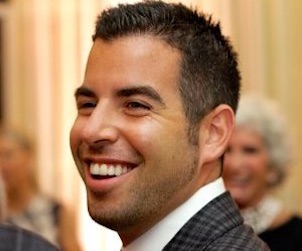Malcolm Jolley talks to Toronto food lawyer and podcaster Glenford Jameson.

Glenford Jameson in the offices of G.S. Jameson & Co. in downtown Toronto.
Like a lot of young Canadians, Glenford Jameson’s first jobs were in restaurants and bars. Jameson has kept his connection to the food world in his practice as a lawyer at his own firm, G.S. Jameson & Co., which advertises “legal expertise in food matters.” I met Jameson socially recently, and I was intrigued to come across a “food lawyer” and on the recommendation of the person who introduced us I checked out his food law podcast, Welcome to the Food Court. After listening to a really interesting episode about calorie labeling at restaurants, I contacted Jameson and sat down with him a few days ago to find out more about what he does.
It turns out in some ways Jameson is a standard corporate lawyer, but with a focus on food related businesses. As he explained, “80 percent of what I do is in the food sector: I live in the supply chain.” That supply chain, of course, is among the most heavily regulated, and its Jameson’s job to keep “stakeholders up and down the supply chain” out of trouble. I asked him what kind of trouble might that be, assuming that when people and companies do get themselves in trouble it’s likely over something they didn’t foresee. He chuckled in response saying, “Oh man, it’s so easy to get into trouble, the food system is remarkably complex”, then he talked about a few specific ways: “There’s trouble from a civil liability perspective, trouble with other people you contract with, whether it’s the public or hospitality businesses, and there’s all kinds of ways to get into trouble including if someone, or a group of people get sick. Then there’s the Canadian Food Inspection Agency and Health Canada. We have this unruly group of statues that are incredibly proscriptive in some ways but incredibly broad and interpretive in other ways. It can be complex to comply with them, and when the CFIA or Health Canada or a provincial agency make it their business that they are.”
Jameson does not foresee an easy ride for food businesses in the immediate future. He said, “One of the things we’re seeing right now is a real change in terms of public trust in our food systems.” Jameson explained the regulator agencies are moving away from a practice based on “acute issues”, like finding out what made people sick to a broader, more preventative approach. He sees issues like food fraud, whether it’s related to safety or just false advertising, like labels of origin or organic status. He mentions a court in California that is dedicated to hearing claims about foods labeled “natural”. He cites a recent Canadian class action suit about that centred on the term “macro-biotic” that settled out of court.
Jameson also explained to me that in food law there isn’t just a wide range of trouble to get into, there’s also a wide range of remedies available to the courts: ways to fix the problems. He named some: “There’s fines, there’s recalls, if you’re an importer your imports can be destroyed, if people were hurt, or worse, you might have to compensate victims or their families.” He added that the Food and Drug Act is enshrined under the federal government’s jurisdiction over Canadian criminal law. That means, he explained, that inspectors with the federal agencies are essentially empowered like the police. “If you get charged under that act”, he explained ominously, “you’re getting fingerprinted and applying for probation because you could go to jail. It’s very different from most industry regulations.”
Despite the scary regulatory stuff, Jameson is optimistic about what’s happening in the food world. A good deal of his practice, he explained, is working with new start-up food companies, especially ones that are trying to change the food system and feed people in new and better ways. He told me about a recent client that employed him to make sure the CFIA would allow the sale of “a particular breed of cricket” as food. (It is.) As he explained, with start-up businesses, regulatory approval for something novel, is often a prerequisite for investors to feel confident enough to raise a round of financing. Or, if a new food company is seeking a contract from a large retailer, they’ll have to prove they are in full regulatory compliance that meets the retailer’s standards.
Looking forward, Jameson is interested in the upcoming free trade deal with the E.U. (assuming, he lawyerly added, it’s ratified). There he said, there will be interesting developments in the way geographical origin labeling is harmonized in Canada with Europe’s extensive regulatory framework. The CETA, he added might be an opportunity for companies he sees that creating third party private “ISO-type” accreditation systems, outside of the public ones. Jameson told me he sees this as part of two faceted trend: first that regulatory frameworks are increasingly being shaped by the demands of customers rather than industry; and second that governments are accordingly shifting their regulatory focus away from simply cheap and safe food to standards of quality. “What’s happening,” he said, “is regulation is becoming more responsive to the consumer, and that’s a good thing.”
Listen to Glenford Jameson’s food law podcast, Welcome to the Food Court on iTunes or at the G.D. Jameson & Co. website here.







